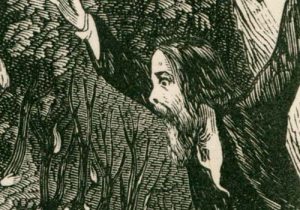In this excerpt from his autobiography, Methodist minister John Brooks presents an engaging description of the bodily exercises he witnessed in middle Tennessee during the 1810s. Click here for the full text of The Life and Times of the Rev. John Brooks (1848).
I will now pass from Georgia to Tennessee. In the latter end of the year 1811, my father moved with his family to Tennessee, and settled in Maury county. The country was a green canebrake and a wilderness. We found a Methodist society within three miles of where my father settled. The leading members of the society were old members from other States. Here I found the society living like the one I had left behind me. My knowledge of the Methodist church became more extensive in Tennessee than it had been in Georgia. Here I went to two day’s meetings and Quarterly meetings from twenty to thirty miles. In all my short travels I found Methodism the same thing that I left behind me. Here I became acquainted with camp-meetings. I had never seen but one in Georgia, and but one day at that. At these meetings I found large encampments with a great many campers; the camps were built of split timber, and some times small poles from eight to ten feet high, covered with boards about four and a half feet long. These camp-grounds were always out in the forest, close by some fountain of water, suitable for the occasion. The dense groves of tall timbers of Tennessee, then produced the most delightful shade I ever saw. The whole country, particularly on the rich lands, seemed almost one shade. In these encampments I found a pulpit reared out of logs, till about three feet high; then a puncheon floor put on them, and a book or hand board put upon two pieces drove into the ground, and a bench made of a split puncheon for the minister to set on. Fronting this stand were large rows of seats made out of timber split open; the split side smoothed a little with the axe, and laid down, their ends resting on long polls. Before the stand was some straw or fodder for the mourners (for they always had them) to kneel on. I soon discovered that great power at tended these meetings and that they would be a powerful instrument in the hands of Methodism to triumph in this country. I found here that the two great armies had met in such a way as one or the other must give back, for here were the strong of the Lord in members and preachers in close battle array with the enemy; that if they kept full of faith and the Holy Ghost, and if the campers kept good order, such as became the occasion, they must triumph. But on the side of the enemy there were fearful appearances; for the strong ones of the devil in all sorts, kinds and characters were here, and seemed to do their best to bring such meetings to a public contempt. Here I first saw what was called the jerks, a very strange as well as disgusting exercise. The persons who would take them would commence their exercise by jerking the head backwards for a few times, and then backwards and forwards in such quick succession, that if the persons standing by did not take hold of them and sustain them, (and this was hard to do, for they seemed to have supernatural strength about them) that they would jerk themselves to pieces. This strange and disagreeable exercise appeared mostly to follow young people, though some of all ages would have it. Neither was it confined to the members of the church, for some of the wicked would take them and curse them while they were jerking them as though they would be torn to atoms. Others would seem very solemn and serious after they had ceased. I at one time ventured to ask a lady of fine character and deep piety, who at times had them very severely, if she could discern that they had any good effect on her. She said she could not see that they had. I asked her if any certain feeling or foregoing indication was realized that they were approaching before they came on. She said she always felt like shouting, and if she shouted they would not come; if she cramped her feelings and did not shout, they would be sure to visit her. This singular exercise passed away in a few years, to the joy of all. But the enemy made great use of it in order to injure those meetings and the work in general, for this exercise was not confined to camp- meetings. In spite of all opposition camp-meetings have continued to prosper and do great good. Hundreds and thousands were converted at them. It is true that the wicked committed deeds of blackest dye at them also.
Source
The Life and Times of the Rev. John Brooks (Nashville, Tenn.: William Cameron, 1848), 25–28.
